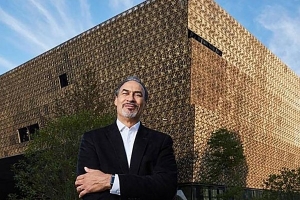
November 18, 2021 - 7:00 PM to 8:00 PM
Virtual - Zoom
The School of Architecture and the Harvey B. Gantt Center of African-American Art + Culture join together to present a panel discussion about the architect Phil Freelon in conjunction with the exhibition Container/Contained: Phil Freelon - Design Strategies for Telling African American Stories.
The late North Carolina architect Philip G. Freelon had a remarkable career of 40+ years with a focus on projects that foreground African American communities and identities. Freelon often noted that architecture should be more than a container, it should help tell the story of – and be integral to – the content of the libraries, public parks, cultural centers, and museums that he designed.
A panel of experts on architecture and identity will discuss the way their own work investigates and reveals intersections between African American history and culture and the design of the built environment. Panelists will explore how the work of Phil Freelon exhibited in Container/Contained relates to those wider narratives.
This event is FREE but registration is required. Please click here to register.
PANELISTS
Dr. Charles L. Davis II is an associate professor of architectural history and criticism at the University at Buffalo. He received his PhD in architecture from the University of Pennsylvania and has an M.Arch and B.P.S. from the University at Buffalo. His academic research excavates the role of racial identity and race thinking in architectural history and contemporary design culture. His current book project, tentatively entitled Black By Design: An Interdisciplinary History of Making in Modern America recovers the overlooked contributions of black artists and architects in shaping the built environment from the Harlem Renaissance to Black Lives Matter. Charles is co-editor of the cultural reader Diversity and Design: Understanding Hidden Consequences (Routledge, 2015), Race and Modern Architecture (University of Pittsburgh, 2020), and Building Character: The Racial Politics of Modern Architectural Style (University of Pittsburgh, 2019). His research has been supported by grants from the Canadian Center for Architecture, the Graham Foundation for Advanced Studies in the Fine Arts, the University of Pennsylvania, and the University of North Carolina at Chapel Hill.
Dr. Emily Makaš is an architectural historian who led the University of North Carolina at Charlotte School of Architecture team that researched and curated the exhibition "Container/Contained: Phil Freelon: Design Strategies for Telling African American Stories." She has a Ph.D. in the History of Architecture and Urbanism from Cornell University and a Masters in Historic Preservation from Columbia University. Her research engages connections between memory and identity and the built environment, especially at memorials, museums, and heritage sites. Her work has focused on Southeastern Europe and includes a monograph on public space and buildings in Bosnia-Hercegovina titled Urban and National Identities and the Rebuilding of Mostar (forthcoming from Routledge). She co-edited the volume Capital Cities in the Aftermath of Empires: Planning in Central and Southeastern Europe (Routledge, 2010) and co-authored Architectural Conservation in Europe and the Americas (Wiley, 2011). She co-led the curatorial team for the “Legacy of Lynching” exhibition at the Levine Museum of the New South that brought to light the history of lynching in Mecklenburg County and was created in partnership with the Montgomery-based Equal Justice Initiative.
Jack Travis, FAIA, NOMAC is an American interior designer, architect, author, and educator whose work investigates Black history and culture and includes forms, motifs, materials and colors that reflect this heritage. The focus of his work ranges from cultural content to sustainable design methodologies, to alternative educational practices. In 1992, Travis edited African American Architects: In Current Practice, the first publication to profile the work of Black architects practicing in the U.S. In June 1985, he established his namesake design studio. To date, the firm has completed projects for clients such as film director Spike Lee, actor Wesley Snipes, John Saunders of ABC sports and fashion retailer Giorgio Armani. In 1994, he founded the Studio for Afri-Culturalism in Architecture and Design, a nonprofit organization that collects, documents, and disseminates information on African Americans and African-American culture. Currently, Travis is working on the flagship exhibition for the Museum of Black Civilization in Dakar, Senegal. Travis is a Fellow of the American Institute of Architects and was inducted into the Council of Elders of the National Organization of Minority Architects, the highest honor that each organization bestows upon its individual members.